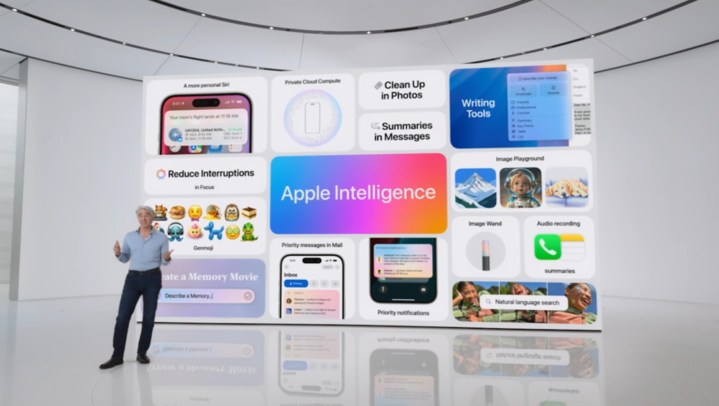
At its Worldwide Developers Conference (WWDC), Apple lifted the lid on Apple Intelligence, its own artificial intelligence (AI) system that infuses your devices with machine learning goodness and AI power.
Want to know if your Mac is compatible? Then look no further, as we’ve listed every Mac that works with Apple Intelligence and what you’ll need to get started. Let’s see what’s required.
Which Macs work with Apple Intelligence?

On its dedicated Apple Intelligence page, Apple has listed every Mac that works with its new AI, as well as the chip you’ll need inside that device. The list is pretty straightforward:
- MacBook Air: M1 and later
- MacBook Pro: M1 and later
- iMac: M1 and later
- Mac mini: M1 and later
- Mac Studio: M1 Max and later
- Mac Pro: M2 Ultra
In other words, an Apple silicon chip (any M-series chip) is essential. That said, the list is fairly generous, as you don’t need the very latest chips and even a Mac released four years ago (like the M1 MacBook Air) will be compatible. So, depending on what Mac you have, you might not need to upgrade at all. Getting Apple Intelligence for free is fantastic news, and it’s something that Microsoft’s AI-infused Copilot+ PCs can’t hope to offer.
How to identify your Mac
Not sure if your Mac is listed above? There’s a simple way to find out what chip it uses. Just select the Apple logo in the top-left corner of your screen, then pick About this Mac. This will open a window that shows your Mac name and type, its release year, the chip it uses, plus other details. Just check that against the list above to see if your Mac will work with Apple Intelligence.
Does Apple Intelligence work with Intel Macs?
Unfortunately, Apple Intelligence will not work with Intel-based Macs. Simply put, the most recent Intel chips Apple used in Macs are from 2019 and don’t have enough processing power to handle Apple Intelligence workloads. That comes down to the Neural Processor used in Apple’s M-series chips, which is leveraged for AI workloads.
Since Apple has designed its AI system to carry out a large number of tasks on your device, that means your Mac needs to have a chip powerful enough to handle a lot of very complex machine learning workloads. In that regard, the older Intel chips found in pre-Apple silicon Macs just aren’t up to snuff, as they lack any sort of dedicated Neural Processor.
Which other devices work with Apple Intelligence?

Apple Intelligence is not just limited to Macs — iPhones and iPads can use it too. According to Apple, the following devices and chips are compatible:
- iPhone 15 Pro Max with A17 Pro
- iPhone 15 Pro with A17 Pro
- iPad Pro: M1 and later
- iPad Air: M1 and later
That means that the latest iPhone 15 and iPhone 15 Plus are not compatible, despite being released at the same time as the iPhone 15 Pro and
If you have an iPad, though, Apple’s requirements are less stringent. As with many Macs, you’ll just need an M1 chip or later to be able to use Apple Intelligence.
What does Apple Intelligence do?

Apple Intelligence is a wide-ranging system that brings AI to a large number of apps and processes within Apple’s operating systems. Some of its best features are subtle, while others are much more significant and attention-grabbing.
It can be used to enhance existing apps and workflows. For instance, it can summarize your notifications so that you know what you may have missed, sort your emails into categories to keep things orderly, and give you more powerful photo-editing tools that are simpler to use.
Like rivals from Microsoft, Apple Intelligence also includes generative elements. At WWDC, Apple explained that Apple Intelligence can create custom emoji (called Genmoji) based on your prompts, rewrite emails using different tones and styles, whip up images based on people you know and photos you’ve taken, and more.
Siri has also received a major AI revamp and now looks set to become one of the most useful digital assistants on the market (a far cry from its previously underperforming version). Apple showed off various new Siri features, including how it is able to understand the flow of a conversation without you needing to repeat details, and the way it can pull up details from other apps and files that you might want to use.
Apple Intelligence is one of the most significant overhauls to Apple’s operating systems in years. That makes it all the more important to know which Macs work with it and whether you need to upgrade your machine. With this guide, hopefully the answer is now a little clearer.



